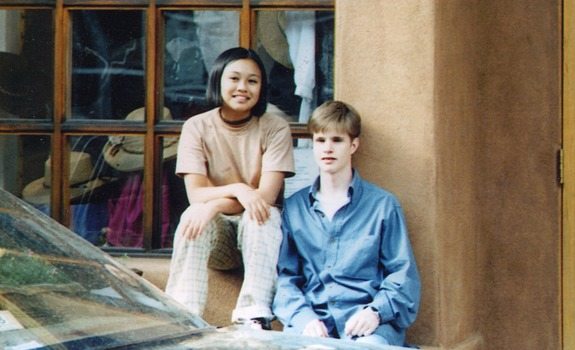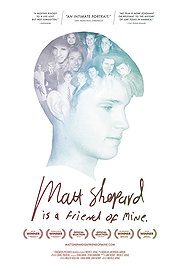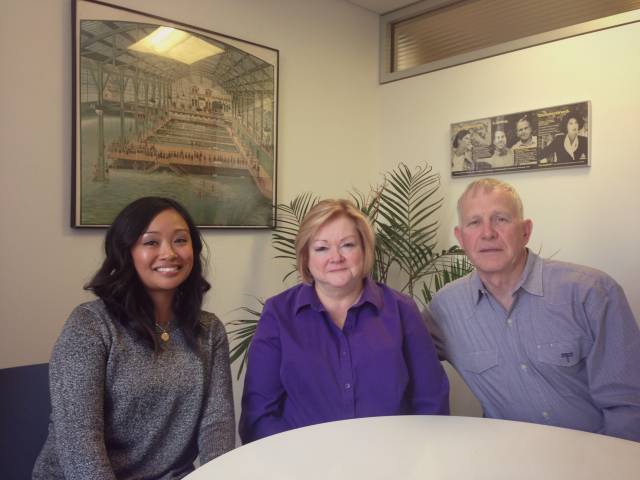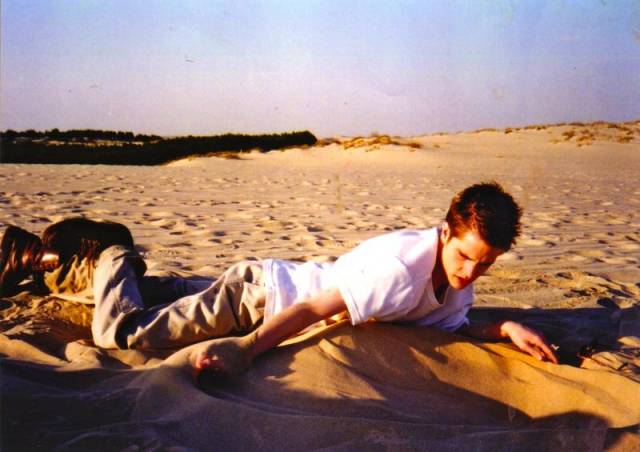
 When Matthew Shepard was killed at age 21, he became an LGBT icon and the driving force behind changes in hate-crime legislation, but there was so much more to him than just his death, and in her feature length directorial debut, Michele Josue paints a portrait of Matt unlike anything we’ve seen before. Matt Shepard is a Friend of Mine tells Matt’s story from the point of view of the people who knew him best: his friends and family. Josue, a former classmate of Matt, presents us with intimate interviews, never-before-seen home footage from the Shepard home and excerpts from Matt’s journal which reveal a complex young man, who was trying to make sense of his life’s purpose, amidst doubts regarding how he thought the world would react to his sexual orientation.
When Matthew Shepard was killed at age 21, he became an LGBT icon and the driving force behind changes in hate-crime legislation, but there was so much more to him than just his death, and in her feature length directorial debut, Michele Josue paints a portrait of Matt unlike anything we’ve seen before. Matt Shepard is a Friend of Mine tells Matt’s story from the point of view of the people who knew him best: his friends and family. Josue, a former classmate of Matt, presents us with intimate interviews, never-before-seen home footage from the Shepard home and excerpts from Matt’s journal which reveal a complex young man, who was trying to make sense of his life’s purpose, amidst doubts regarding how he thought the world would react to his sexual orientation.
Josue’s film reveals a sweet, young man, whose smile could light up any room he entered, who knew the path he wanted his life to take, but also a man whose innate goodness might have more often than not become a detriment. The documentary follows his life story chronologically and as we see his evolution, the title becomes accurate, for we too feel like we’re his friends. The assured direction by Josue avoids turning him into a saint, and instead suggests that people loved Matt precisely because of his flaws. By the time the film tells of a horrific episode that occurred in Morocco, we wish that we could reach out to the screen and hug Matt.
After making the festival circuit, Matt Shepard is a Friend of Mine is finally being released commercially and it’s a piece of filmmaking that should be seen by as many people as possible. Last November I had the opportunity to talk to Josue, and Matthew’s parents Judy and Dennis, who kindly talked about the film’s objectives, as well as their work as activists. They were so warm and welcoming, they even shared an anecdote or two about their late son, it was truly an honor to be in their company.
 In the years since Matthew’s death what would you say has been the biggest achievement you’ve seen when it comes to acceptance of other LGBT youths.
In the years since Matthew’s death what would you say has been the biggest achievement you’ve seen when it comes to acceptance of other LGBT youths.
Judy: One of the things that really changed the conception of the country was changing the leadership, it became OK when Obama was elected to accept the gay community. When Bush was president it was not OK, so we had that going for us, so we laid a lot of groundwork with families, encouraging them to love their children, their neighbors and their coworkers and accept them for who they were. There was so much “watercooler talk” at work, where people would share their stories and wanted to be free and to be themselves. We also did work with corporations and brought them on board to embrace their employees. We had people of influence and note in places of power, a lot of things happened at the right time. One of the things that Matt’s story did was to convey to the straight community what was happening to the gay community, because it was not mainstream media before that. Most of the mail we got was from the straight community saying they had no idea this was happening. Culturally, Will and Grace was on TV which brought the gay community to people’s living rooms, then Modern Family, Queer as Folk, The L Word.
Dennis: Elton John became an icon too, instead of being a performer who was a bit strange he became an icon, a model citizen and someone to look up to. But let me turn this on you, you were 12 when Matthew died, so what do you think has been the biggest change?
It probably was the fact that it made me realize that I had to be somewhere where I would be accepted and it gave me the courage to come out to my family. Being from a Hispanic family, it made me feel that I would never be accepted and that I would get kicked out of my house, but my parents were so warm and loving. My father told me he was disappointed because he wanted grandchildren…
Judy: It’s exactly what Dennis said as well (laughs).
I felt like the weight of the world had been lifted from me. Something that moved me a lot about the film, was that we usually never hear stories about friends of LGBT icons, and in a way, many LGBT people who are rejected at home, turn to their friends and they become their family. I wanted to know more about what inspired you, as Matt’s friend, to tell his story.
Michele: That’s a hard question because the film has been sixteen years in the making, but since I was a storyteller and a filmmaker when he passed away I felt it was my duty to share a story, not just from a friend’s point of view, but also from his parents and I thought that I could piece it all together, since I was close to him and knew everyone involved. I wanted to show a real human side that no one got to see before. It was also important for me to let the world know that he had love and support from his friends and his parents. It’s been a four year long journey and it was very daunting now that I look back at it, but it was about taking one step at a time.
Was it hard for you to give the film a structure since the subject touched you so much on a personal level?
Michele: Oh gosh yes, it was very difficult. Structurally it was pretty straightforward, our team knew that the easiest way to do it was to share Matthew’s story chronologically and to paint as accurate a portrait as we could.
One of the things that struck me the most about the film was that we see Matt watching TV at home, and although you say that he wanted to be famous and become an actor, I don’t think I’ve ever read anything about what shows or movies Matt loved.
Michele: He loved The Rocky Horror Picture Show, loved it! Also The Phantom of the Opera...I mean we were kids of the 90s, so whatever was awesome back then. He loved “True Colors” by Cyndi Lauper, and every time it comes on the radio I think about him. He loved theatre.
Dennis: He loved acting growing up, in junior college, in the theatre groups they had there, they had a lot of parts and asked him if he was interested, things like Our Town.
Michele: The Music Man too! He was also a news junkie, so CNN (laughs)
Judy: He was obsessed with politics.
What were some of the stories that interested him?
Judy: He absolutely thought that President Clinton was the second coming, he was enthralled by him. He was involved in his first political campaign when he was seven, you know those flyers that people hang, one of his friends from grade school, his mom was running for something, so Matt participated in the campaign and then when he would go to get his hair cut he would tell the girls who to vote for. He thought it was such a responsibility that you knew what was going on, that you know who to vote for, know the issues and that you knew who to vote for. He couldn’t wait to get a chance to vote.
Dennis: He knew it was a privilege to be able to vote.
Judy: He took that on as his cloak, his goal in life was to be an activist.

Michele, when you talk to Father Roger in the film, it reminded me of The Matthew Shepard Story, because it touched on the same issue presented in the film which was when Matthew’s parents decided not to pursue the death penalty and sought to forgive them instead. It made me wonder how was it for Judy and Dennis to see actors playing them and for you Michele, as a filmmaker, if your film was influenced by any other depictions of Matt’s story in the media.
Michele: Just in the sense that when I would see this projects at the end of them I was left thinking, why couldn’t the real people tell their stories? Because it was surreal to see actors playing people I know, so that’s why I wanted for my film to be a documentary to have people hear about Matt from people who actually knew him and loved him.
Judy: We agreed to do that film because they promised us it would be the truth, but it wasn’t the truth. They changed so many things in the film from reality, the only thing that was true about it was how the main character died. Stockard [Channing] was amazing, it was a good movie, but it wasn’t about Matt. We did become friends with the young man who played Matt, a delightful young man, but it was a very hard learning experience for me, because things like that are never the truth. I was thrilled when Michele wanted to take on the project because that would be the truth forever, but the movie changed so many things and depicted things that we tried so hard to stay away from, like Matt coming out to me. In the movie he came out to me after he’d been assaulted, which was such a terrible message, and it’s not at all how it happened. It was a very discouraging experience.
Dennis: The first screenplay by the original writers was right on track but then they lost their contract and when they did the rewrite they had two people who didn’t know anything about the story, who didn’t know anything about us, and they started changing things, so Judy told them she wasn’t going to endorse the movie. They flew her out to Toronto and they’d made script changes the night before they started shooting, so she was one unhappy mother.
Judy: I was furious! They changed history and it was so maddening because we tried so hard to make it true. So the only things that are true are The Laramie Project, Michele’s film, my book and some beautiful artistic things that have been done about Matt from a conceptual point of view.
As parents and friend of a gay man, what would you say are depictions in the media that ring true about being part of the gay community?
Judy: The idea that stereotypes are in shows like Will and Grace for example, yes they have stereotypes but what they did was that it brought into the living room of everybody who watched the show. Everybody knew Jack and Will and even though they were stereotypes it made them familiar and helped erase the scary part in people’s minds. And then along came Modern Family, and yes, they are still stereotypes but everybody loves them, so they changed the conception of the gay community as a whole. A true depiction would be everyday people (laughs) what I reject are a lot of Latin American depictions of the gay community which are really the ridiculous depictions of the gay community. But we are inserting gay characters in the shows, and sometimes they’re real and sometimes they’re stereotypical but they’re in the show.
Michele: They’re visible and that helps, just the fact that there’s such an abundance of these characters is amazing and important.
Judy: Visibility is everything.
Michele: Having been on the LGBT film festival circuit, there are so many amazing, rich, LGBT cinema. I haven’t seen it but I have heard such amazing things about The Way He Looks, that I can not wait to see it. It’s an honor for me to be programmed with such diverse films that not a lot of people get to see a lot of the times.
Judy: I wish there was a larger outlet for these kinds of films, so that everyone could get to see them, but there’s not yet, but there will be.
There are still horrific stories about how people receive LGBT films on other countries, for example in Kiev, masked men burned down a theater showing LGBT films. I was wondering what kind of work you would be doing in Russia, since you are going there with State Department representatives.
Michele: The Side by Side Lesbian and Gay International Film Festival is working with the State Department to bring us over and we’ll present the film to Russian LGBT audiences and hopefully meet with families in St. Petersburg and Moscow and talk about their experiences.
Judy: We’re thinking that we can offer our experience as parents of a gay child, to families there, and remind them that they should embrace their child, that it’s not a choice, that losing your child is something you don’t want to experience.
 Watching the film reminded me about being a kid at your parents’ house and talking to your friends, and not wanting your parents to know what you’re talking about. Was there anything in the film or the footage that surprised you about Matt that you didn’t know about before?
Watching the film reminded me about being a kid at your parents’ house and talking to your friends, and not wanting your parents to know what you’re talking about. Was there anything in the film or the footage that surprised you about Matt that you didn’t know about before?
Judy: The one thing that comes to mind and the one thing we didn’t know was that Matt was afraid to come out to us.
Dennis: That really hurt. Sometimes it’s harder to come out to your family than to come out to your friends, cause you don’t want to disappoint them, but we would have never thrown him out.
Judy: I think that’s a very common fear.
Dennis: Even if you’re straight and you come to your parents and say “I want to be a taxi driver, instead of being President of the United States”. No matter what you do, there is always going to be a little disappointment here and there, and you don’t want to disappoint your parents no matter what you do.
Judy: You can create the most accepting, welcoming family environment and the fear is always going to be there, because society tells you it’s something wrong.
Michele, were you afraid about showing something too personal on the film?
Michele: It was important for me to show these moments, so people would start reconnecting with Matt in a more human, emotional way, so they would understand him and think of him as someone they could’ve been friends with. So having him goofing around or joking, and writing his poems, was important for me to include, it wasn’t easy to show his darkest moments and struggles, but we thought about it a lot, and that was an important part of who Matt was, because we all have fears and traumas.
Dennis: Another thing I was surprised about is that I didn’t know he was keeping a diary, all this stuff that came out in the film, I didn’t know any of it existed, because we didn’t really go into the kids’ rooms and go through their stuff. So the fact that he was doing this after high school was pretty surprising to me that he wrote that well and was thinking so much in depth. I’m really proud of his writing.
Michele, you don’t really include yourself in the film, and I wondered, since this is your first feature length, if part of why you wanted to become a filmmaker was because you wanted to tell this story.
Michele: I’m in the film prominently, but it’s not about me. We discussed it with the team whether I should be visible or not and we just thought it was an important piece that I was going through this and that you can go on this journey through me. I’m like the proxy in a way. It didn’t feel important to me to talk about my personal life. I was already in love with storytelling when Matt died, I was a sophomore in Emerson, so I always wanted to do film and then when this happened I felt if I ever made a feature film it should be about Matt, because that what he would want and what he deserved.
I thought the title was very touching. I was wondering how you came up with it.
Michele: The title is deceiving in a way, because although he was a friend of mine, I wanted it to be an inclusive statement. I didn’t call it Matthew Shepard Was a Friend of Mine, when I think of the name Matthew Shepard I think of the gay icon who represents the hate and intolerance that the LGBT community faces every single day. But we always called him Matt, so it was important that the title was in present tense because we still love him, and that by the end of the film people who watch the film would think that Matt was a friend of theirs.
And for you, Judy and Dennis, unintentionally you have become parent figures to many LGBT youths as well, and I’m sure I’m not the first person who starts telling you about their own life. Is that strange on some level?
Judy: Since Matt’s funeral this is what happens, people trust us.
Dennis: It’s an honor. It means a lot to us that you would trust us. People carry burdens and it’s important to remember that people love you for who you are and not for your nationality, religion, but just of who you are. I’ve had people come up to me and tell me “thanks for being my dad”. It hits you.
What do you hope people will take away from the film in the end?
Judy: When we wrote the book, people didn’t know Matt, they knew Matthew Shepard. I wanted them to meet our Matt.
Dennis: The book was about our Matt as member of our family, the film is about Matt as a friend of everyone he was in contact with, and the idea is to show that he was a normal kid with good parts and bad parts.
Judy: We both felt that Matt was being depicted as this perfect child which he was not.
Dennis: He could be a pain in the butt (laughs)
Judy: He was a typical kid, he was murdered when he was 21. I would not want my 21 year old person to be memorialized and that the only thing people would know about me was that I drank too much and didn’t go to class. That’s unfair, there was so much more to Matt than his murder and we just wanted people to know that.
Matt Shepard Is a Friend of Mine is now playing in select theaters, to find if the film is screening near you click here. Join the cause and learn more about the Matt Shepard Foundation on their website. You can also visit Matthew's Place, a space by LGBTQ+ Youth for LGBTQ+ Youth.